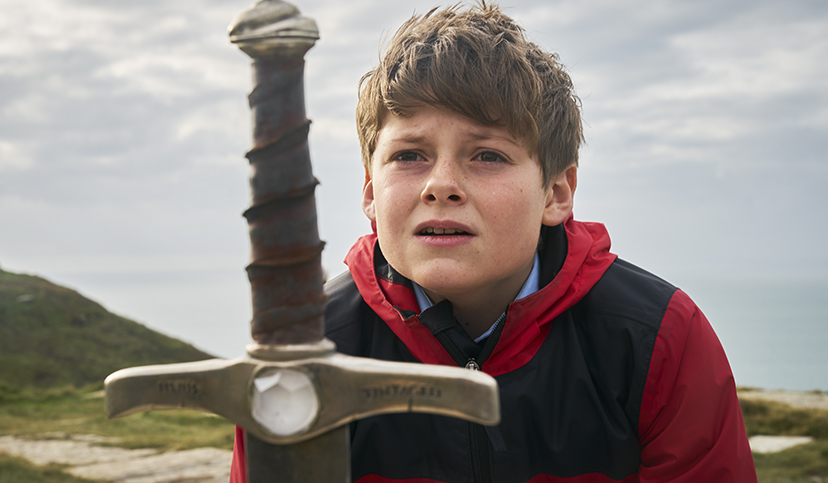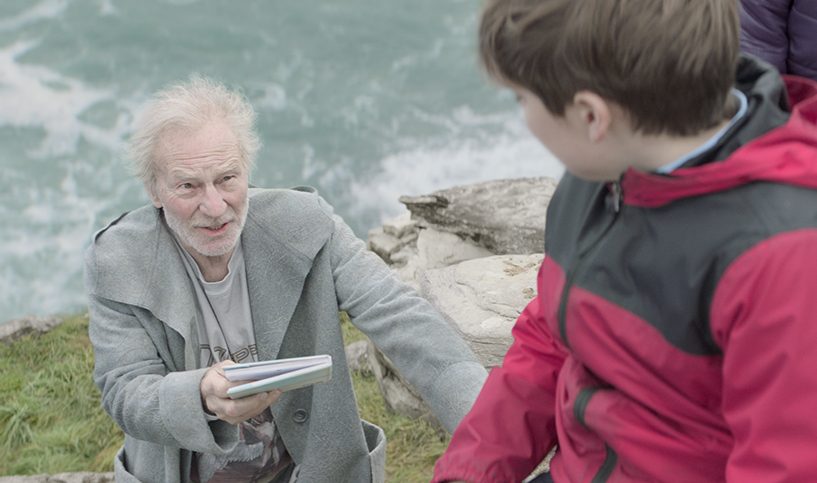Sir Patrick Stewart is a legend of stage, TV and cinema. His latest role is the iconic wizard Merlin in The Kid Who Would Be King, a new fantasy adventure that throws old school magic into a very contemporary world and watches the sparks fly.
Sporting rubber boots and a Led Zeppelin t-shirt, Stewart’s eccentric Merlin offers guidance to four British school kids who, armed with King Arthur’s magical sword Excalibur, battle evil sorceress Morgana (Rebecca Ferguson) for the not insignificant matter of the fate of the world as we know it. Full of huge action, big laughs and a whole lot of heart, The Kid Who Would Be King takes the legends of chivalry and honour and makes them modern as a new breed of knight swaps an iPhone for a broadsword.
In an exclusive interview, Stewart discusses his unique take on the mythical character, working with writer and director Joe Cornish (Attack The Block), his delight at finally playing a Wizard and the significance the story has for the younger generation.
How would you describe Merlin’s role in the film?
He is a rather unconventional Merlin and that was a particular delight for me. I wanted to make him as un-magician like as possible. My approach was to find a strong, persuasive, impressive character, more based on what he achieved than in how he behaved. So I didn’t do much “wizard” acting as such. At times I enjoyed appearing a little confused and not certain what to do next rather than being the all powerful, all knowing great medieval wizard.
It is surprising you have never played a wizard before.
The Kid Who Would Be King allows me to enter this exclusive club of British actors who have played wizards. I was beginning to feel a little overlooked. My dear friend Ian McKellen became a living legend with his performance as Gandalf in The Lord Of The Rings. And then there are the Harry Potter stories which Michael Gambon has done so brilliantly. But nobody had ever come to me and said, ‘How do you feel about playing a wizard?’ until Joe came along.
As soon as he began to describe the story, I knew it was something I was not able to resist and it would at long last be my opportunity to create my own wizard. My Merlin is pretty whacky. For one thing, he looks a little strange but he is a fun, energetic and surprising character. In every respect, it was a delight to work on it.

Courtesy of 20th Century Fox
Joe Cornish has said one of the reasons he cast you is that you have a playfulness.
Do you think that is vital for Merlin? It certainly is in this story. To have humour, irony, wit and some jokes thrown in, this has been a brilliant move. I am flattered that Joe said that. As my career has gone from stage to stage, I now find myself in a stage where comedy plays a bigger and bigger role in what I do. And I love it so much.
What are your memories of working with the young cast?
Their commitment to the work, their seriousness, their determination to hear Joe Cornish’s advice and try to move what they were doing in that direction it was all so impressive. I enjoyed their company very much.
How did you find working with Joe?
He’s very script based, which is fine for me after all my years of Shakespeare, Stoppard and Pinter. To me the script is everything, not just the narrative but what the script says about the character. Joe was very intent on the script revealing who Merlin was and what his objectives were. And that for me was very important. He had this idea since he was a child so I want to listen, I want to say, “What is your feeling about this?” Those are insights that you can’t replicate.
The ambition of his storytelling is huge.
The Kid Who Would Be King has more scale to it than I first anticipated on first reading the script. It has a drama on such a scale that was completely unexpected and will be very, very exciting. There are really quite scary elements of danger in the movie but they are also surrounded by a world of fantasy. Even though we are in the 21st Century, there is a sense that just around the corner is a medieval world of magic.
It’s a family film in the true sense of the word.
It’s not just for children, it’s for every member of the family? Yes. Sometimes “family film” has an unfortunate connotation. It can be a bit soppy and soft and silly. This movie is about very serious matters. It’s a film about duty, responsibility, believing in yourself, taking actions that will help society become better. These are important messages for young people to hear. The characters are taking serious risks in order to achieve this good outcome for its country and its people.
Despite the motifs of Arthurian myth and magic, it’s a very contemporary story.
This is recognisably present day England, certainly London. These children are already fighting challenges in their life around them but they now have a responsibility to save the planet. That is a delightful prospect. It’s not politicians or generals saving the world but children. It’s not just a source of humour, it’s a source of profound seriousness both politically and philosophically that it is children who have to deal with this.
One of the themes of the film is that any kid can be a king. That’s an empowering idea, isn’t it?
It is so totally empowering. In that sense, it is proper and exciting that we have children of different races and genders. I can’t wait to sit in a cinema full of kids and see how they respond. I hope to take my grandchildren to the opening night. I think young people are under so much pressure these days. It overwhelms me when I talk to my granddaughter who is sixteen and my grandson who is twelve: the lives they have are so intense and they are under so much pressure from school, from parents, from society, from contemporaries around them.
This is a film that could leave a really big impression on children in that it can show them how meaningful their lives might be and how they can contribute to society. It would be very nice if symbolically this would become an important film for young people.

Courtesy of 20th Century Fox
What would you like audiences to take away from it?
I’ve always believed from the very beginning that the primary job of an actor is to entertain. If you are not entertaining, you are not doing your job. But entertainment has a multitude of meanings. I would like this audience to be captured by the story, sometimes alarmed by it, sometimes amused by it. When I saw the film, we were all very touched by different aspects of it. I do believe there is a possibility it can have quite an impact on the way parents and their children view the world and their place in it.
Images courtesy of 20th Century Fox. This interview is exclusive to bazaar publishing in Kuwait and is courtesy of 20th Century Fox Middle East, @20CenturyFoxMe on Instagram. Catch The Kid Who Would be King from the 24th of January.











